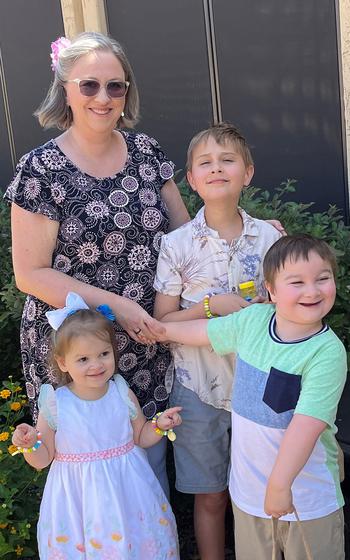
Cassandra Wheeler, the wife of a medically retired Army veteran and the mother of two autistic children, said Tricare gutted the care it provides for the autistic children of military families last year. (Cassandra Wheeler)
Cassandra Wheeler said she felt an upswell of anger when she saw a recent social media post by Tricare, the military’s health care provider, in support of Autism Acceptance Month.
Tricare called for “inclusivity” and “tolerance” for autistic children through “patience, understanding, and education,” according to the April 8 post on the provider’s official Facebook page. As of Friday, it had received about 800 mostly critical comments, and was shared about 400 times.
Wheeler, 34, the wife of a medically retired Army veteran and the mother of two autistic children, said Tricare gutted the care it provides for the autistic children of military families last year.
What Tricare is doing “is not OK,” she told Stars and Stripes by phone April 13 from her home in Westfield, Ind. “We’re hurting as a direct result of decisions you have made. Our kids are suffering.”
The Defense Health Agency, which oversees Tricare, rolled out a series of “comprehensive” changes to its Autism Care Demonstration program beginning March 23, 2021. The program pays for applied behavior analysis, or ABA, therapy for children diagnosed with autism spectrum disorder, according to a statement on the Military Health System website.
The demonstration program will move toward a “beneficiary-centric model” that helps autistic children “reach their maximum potential” and “empower parents” to have a greater role in the care their child receives, according to the health system.
Yet parents said the changes included more stringent requirements to access ABA, an approach that seeks to increase helpful behaviors and decrease harmful ones, according to the nonprofit Autism Speaks’ website.
For example, children with multiple conditions that include autism, such as intellectual disabilities, epilepsy and gastrointestinal issues, are no longer eligible for ABA, a senior policy analyst and clinical psychologist at the Defense Health Agency, Dr. Krystyna Bienia, told Stars and Stripes by phone Thursday.
The changes also added layers of bureaucracy, according to some parents of autistic children covered by Tricare. This includes additional case workers, increased assessments, tighter timelines, more paperwork for parents and providers and intrusive stress assessments for parents that asked about things like their sex lives.
Tricare also cut funding for ABA therapists to accompany children to school or other medical appointments, parents and Bienia said.
The Wheelers’ middle son, Sawyer, 6, was dropped by his clinic in December for nonpayment and because Tricare began micromanaging his care plan, Cassandra Wheeler said. She said he lost ABA, speech and occupational therapies for four months before she found another provider that would accept Tricare.
Another military mother said she experienced similar delays.
“My son has been on wait lists for developmental [pediatricians] for over four years in total and he’s 7 years old,” Space Force spouse Cara-Lee Alford told Stars and Stripes by phone on April 13. “They kept referring us to who they thought was a developmental pediatrician in Alabama, but they weren’t a developmental pediatrician.”

Space Force spouse Cara-Lee Alford poses with her children, Audrey, 4; Matthew, 10; and James, 7, in this undated photo. Alford said James has been on a Tricare waiting list to see a developmental pediatrician for over four years. (Cara-Lee Alford)
Merit to complaints
Many of the criticisms levied by the parents have merit, Bienia said, but families may have been getting services outside Tricare’s scope of coverage, such as allowing therapists in community settings. Requirements for providers ensure there is no fraud, waste or abuse.
“It breaks my heart that there is this gap in services,” she said. “I think there are worldwide gaps in both clinical and non-clinical services, but Tricare is only authorized to cover that clinical part.”
ABA therapy is not covered as a basic benefit under Tricare because it doesn’t meet reliable evidence standards, Bienia said. Tricare has been funding ABA through the demonstration since 2014 to see if it meets certain “goals and objectives.” If it is determined that it does, the therapy could be added to a suite of covered services in the future, which includes occupational therapy, speech, physical therapy and psychiatric services. The program expires at the end of 2023 but could be renewed, she said.
Dr. Farrell Weiers, a clinical psychologist and behavior analyst at Family First Center for Autism and Child Development in Kansas City, Mo., said her experiences and outcomes with Tricare were “mostly positive” prior to the changes.
“The latest changes to the Treatment Manual, however, are vague and our success rate is much more hit and miss,” she wrote in an email Thursday to Stars and Stripes.
The changes have “significantly” slowed down their ability to get a child started in therapy, she said. “I have a serious problem with the measures that were chosen.”